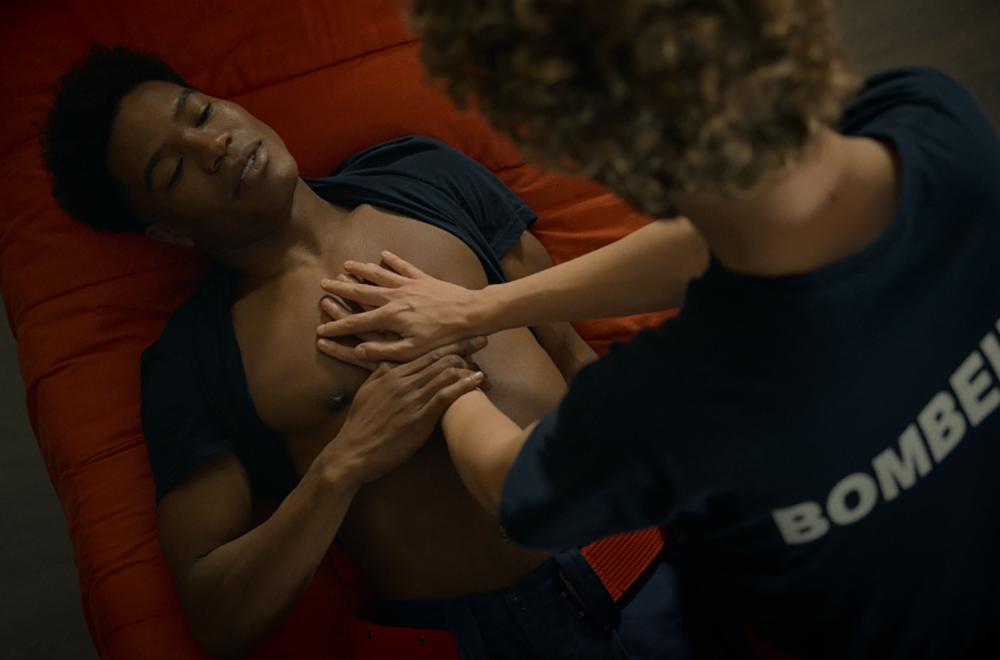João Pedro Rodrigues’ “Will-o’-the-Wisp” (“Fogo-fátuo”) creatively, although disjointedly, examines colonial oppression and the effects of remembrance in the relationship of a young prince and a fireman by utilizing a vignette structure that invokes different genres and the intertwining of the erotic with the surrealistic,
Although the ‘Main Slate’ and ‘Spotlight’ sections in the New York Film Festival are the ones getting the most attention (of course, those are the “bigger” films that have made their way through multiple festivals and have become critics’ darlings or have famous stars attached), the ‘Currents’ selection is its most fascinating in a way. Why? Because it has a more eclectic array of films from striving filmmakers or ones on the rise. Their visions are creative and distinctive, surprising the viewer with their talent. And hopefully, one day, some of these filmmakers showcasing their films in the ‘Currents’ selection may become big names and get more significant opportunities.
There are a lot of intriguing features this year, and the ‘Currents’ opening night film, João Pedro Rodrigues’ “Will-o’-the-Wisp” is one of them. Even with a short run-time of sixty-seven minutes, it is hard to describe Rodrigues’ latest feature. There are many ways to define it than just by simply putting it in the box of the various genres.
‘Will-o’-the-Wisp’ Defies Singular Cinematic Description
Is it a surrealistic ballad of newly found love? A romantic comedy intertwined with moments of musical fantasia? The story of repressed desires through reflections of the past and glimpses of the future? A portrait of an interracial queer romance that’s embalmed in the fetishism (or fixation) of colonial oppression? A confection that questions both climate change and racial, as well as economic, inequity?
Just by thinking of the ways to describe it to a friend or colleague, you just notice João Pedro Rodrigues’ artistic singularity. “Will-o’-the-Wisp” is not only one of those descriptions I presented above, but all of them combined. It is wrapped in a small package that will have audiences aching for more. Immediately as it starts, the film grapes you in its collection of surprises and genre-bending hallucinations. It begins in the year 2069 when Portugal’s King Alfredo (Joel Branco) is on his deathbed. King Alfredo recalls his erotic exploits and social activism when he was a young prince (played by Mauro Costa).

Alfredo sees the news of devastating forest fires in the news and wants to do something to help, as it is “his duty” to help the place he will one day reign. So, against his wealthy royal family’s wishes, Alfredo volunteers as a fireman. This paves the way for him to land in the arms of one of the firefighters, Afonso (André Cabral).
The Film’s Dance Sequences and Musicality Infuse a Dreamlike State
Here is where Alfredo explores his political and sexual awakening through a vignette-esque structure tightly knit by the sequences of disjointed yet stylized images—each of which invokes a different genre. The film plays with its setting and time frame, as it all feels like it is in a fantasy realm rather than reality. Its color schemes and production design dwell on the surrealistic fashion of a musical instead of placing it in a grounded atmosphere. This is a well-thought-out decision by Rodrigues. The film takes the audience onto a fantasia-riddled journey that beautifully encapsulates the feelings of remembrance.
“Will-o’-the-Wisp” feels like a person’s recollection of memories that shaped his life for the better years later. However, there’s something more amidst the recollections; there are moments that feel infused by dreams and nightmares. The dance sequences, or its lovely sonnets of musical fantasia, act as a dream-like version of the events that transpired. The audience doesn’t see the exact thing that happened, only sharply-choreographed cavorts of fancy and passion; yet it’s noticeable it’s a fixed memory. The fellow firefighters that treated Alfredo with jokes at the moment he arrived, mocking him for being a royal and volunteering as if it was a publicity act, now join in unison by dancing to the bursting love of the young prince and Afonso. Meanwhile, the screen’s covering in thick gray smoke while Alfredo is in the reenactment acts as a nightmare—the bad things that happened during his stay.
‘Will-o’-the-Wisp’ a Great Way to Open NYFF’s Most Creative Selection

It is these scenes that create an amusingly disorienting effect, like hearing one’s favorite song in reverse. I got this feeling while listening to Melody’s Echo Chamber’s new track, “The Cure,” from her latest record “Unfold” (which is amazing, by the way). When one starts to remember an impactful event and both good and bad things arise, there’s this mental distortion of wanting to forget. At the same time, one wants to be able to withstand stormy memories because it ultimately shapes us.
Like recalling the past, the film transports audiences through this short myriad of sequences containing surrealistic haze. In the case of “Will-o’-the-Wisp,” the world that Rodrigues wants to build here finds itself between the erotic and phantasmagorical, aided by skillful, albeit slightly messy (in some scenes), direction. The film doesn’t want to imitate reality but to express its themes through a bizarre yet wildly intriguing feat of cognitive souvenirs. It is a great way to open the festival’s most creative selection.
“Will-o’-the-Wisp” is part of our continuing coverage of the 2022 New York Film Festival (NYFF).
Support the Site: Consider becoming a sponsor to unlock exclusive, member-only content and help support The Movie Buff!


